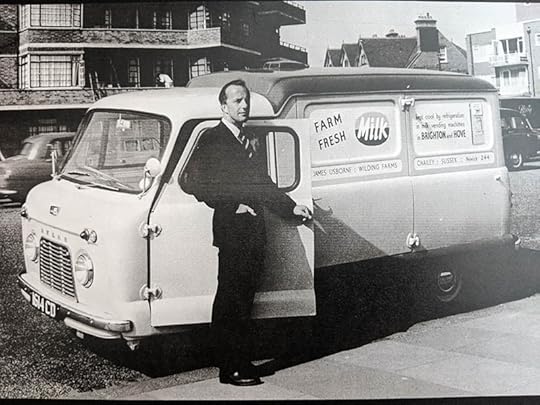Nick Usborne's Blog, page 7
April 9, 2023
First, my father taught me to work hard…

My father was a farmer and a natural-born entrepreneur. I grew up watching him try various ways to expand his farm business.
For example, in the photo above you can see him standing by his milk carton delivery van in the early 1960s. As far as I can tell, he was the first farmer in the UK to carton the milk from his farm, and sell the cartons from refrigerated vending machines in local towns.
By the age of about 8 or 9, I was out there on the farm with my brothers, earning my pocket money… bringing in the cows for milking twice a day, baling the hay in spring, harvesting wheat and barley in the summer… and helping to fill those vending machines each day.
Every Friday I would line up with all the other farm employees and collect my wages. I received a few coins in a brown envelope. How much “pocket money” I received depended entirely on how many hours I had worked on the farm that week.
As I grew into my teens, I took on harder work on the farm and my hourly rate increased accordingly.
Incredibly, I was about 16 before I learned that other kids received pocket money for free. They didn’t have to work for it at all. It was a gift. That was quite an interesting moment for me!
Looking back I now realize that growing up on a farm, and earning money for the hours I worked, has been a formative influence in my own businesses.
My father taught me about hard work. He taught me all the fundamentals that have supported me and driven me during my own adult life.
But there is one lesson he taught me that I got very wrong. Or rather, I just didn’t get it.
During the first three quarters of my own work life I was driven by the idea that I had to work really hard, all of the time, and that I would be paid for the hours I worked. That is the lesson I learned back on the farm.
But by doing that I had misunderstood a key element of my own father’s success. He didn’t just make money by the hour. He was very smart at leveraging his assets as a farmer. He found smart ways to make money. New ways to make money. Like his vending machines.
But it took me a very long time to understand that part of what he taught me.
For too many years I was focused intently on working hard and being paid by the hour. Maybe that’s the freelancer’s “disease”. Whether we bill by the hour or by the project, we are simply being paid for the hours we work. Just like a farm labourer.
It took me a couple of decades before I started to be more like my father, finding smarter ways to profit from my experience, my brand and my intellectual assets.
I now write, consult, and publish programs and courses. And, of course, I have my coaching business. And a day rarely goes by when I’m not thinking of new ideas and possibilities.
Think about this for yourself. Beyond being paid by the hour or project, how else could you profit from what you know and do?
What can you do that makes you less like me as a farm labourer, and more like my father as an entrepreneur?
If you want some help in developing your more entrepreneurial side, you may want to hire me as your one-on-one coach.
“Nick Usborne has helped me really see my strengths and weaknesses in marketing my services. In a very short time, he has taken me to a new level. Nick pointed out some assets that I hadn’t been fully exploiting. That gave me a lot more confidence. What a relief it is having someone to consult with who is focused on my success. It is such a blessing.”
Katherine Andes
Learn more about my coaching service here…
The post First, my father taught me to work hard… appeared first on Writing for the web - online copywriting and content writing..
First, my father taught me to work hard… and then he taught me something I was slow to understand.

My father was a farmer and a natural-born entrepreneur. I grew up watching him try various ways to expand his farm business.
For example, in the photo above you can see him standing by his milk carton delivery van in the early 1960s. As far as I can tell, he was the first farmer in the UK to carton the milk from his farm, and sell the cartons from refrigerated vending machines in local towns.
By the age of about 8 or 9, I was out there on the farm with my brothers, earning my pocket money… bringing in the cows for milking twice a day, baling the hay in spring, harvesting wheat and barley in the summer… and helping to fill those vending machines each day.
Every Friday I would line up with all the other farm employees and collect my wages. I received a few coins in a brown envelope. How much “pocket money” I received depended entirely on how many hours I had worked on the farm that week.
As I grew into my teens, I took on harder work on the farm and my hourly rate increased accordingly.
Incredibly, I was about 16 before I learned that other kids received pocket money for free. They didn’t have to work for it at all. It was a gift. That was quite an interesting moment for me!
Looking back I now realize that growing up on a farm, and earning money for the hours I worked, has been a formative influence in my own businesses.
My father taught me about hard work. He taught me all the fundamentals that have supported me and driven me during my own adult life.
But there is one lesson he taught me that I got very wrong. Or rather, I just didn’t get it.
During the first three quarters of my own work life I was driven by the idea that I had to work really hard, all of the time, and that I would be paid for the hours I worked. That is the lesson I learned back on the farm.
But by doing that I had misunderstood a key element of my own father’s success. He didn’t just make money by the hour. He was very smart at leveraging his assets as a farmer. He found smart ways to make money. New ways to make money. Like his vending machines.
But it took me a very long time to understand that part of what he taught me.
For too many years I was focused intently on working hard and being paid by the hour. Maybe that’s the freelancer’s “disease”. Whether we bill by the hour or by the project, we are simply being paid for the hours we work. Just like a farm labourer.
It took me a couple of decades before I started to be more like my father, finding smarter ways to profit from my experience, my brand and my intellectual assets.
I now write, consult, and publish programs and courses. And, of course, I have my coaching business. And a day rarely goes by when I’m not thinking of new ideas and possibilities.
Think about this for yourself. Beyond being paid by the hour or project, how else could you profit from what you know and do?
What can you do that makes you less like me as a farm labourer, and more like my father as an entrepreneur?
If you want some help in developing your more entrepreneurial side, you may want to hire me as your one-on-one coach.
The post First, my father taught me to work hard… and then he taught me something I was slow to understand. appeared first on Writing for the web - online copywriting and content writing..
March 25, 2023
Why I don’t compete with other freelancers or solo professionals.

Maybe you think I’m wrong. Maybe you think we all have to compete with other freelancers.
Certainly, we live and work in a competitive landscape. It’s a rare thing to have a client who is never going to be approached by other freelancers. And those companies hiring freelancers are always comparing freelancers, by skill set and by price.
Even so, I don’t compete with other freelancers.
I don’t price my services based on what other freelancers charge.
I don’t try to match the services offered by other freelancers.
And I certainly don’t change my pricing if a client or prospect says something like, “We’d like to work with you, Nick. But freelancer “A” is offering much the same at a price that is 30% less.
That isn’t to say I never negotiate on a deal. I do.
Sounds like I’m just contradicting myself, right?
But I’m not.
Here is the difference.
If I were to compete with other freelancers for work, I would become reactive. I would react to what others are charging, or to the services they are offering. I would react to that client who tells me another freelancer is offering to do the same job for less.
And if my freelance business becomes reactive, then I lose control of my direction. I am no longer in the driver’s seat. I am handing over a measure of control to other freelancers.
No thanks.
I prefer to be in the driver’s seat of my business at all times. I want to be proactive, and let other people react to what I do…if they choose to.
I still compete, by finding gaps in the market and maximizing the perceived and real value of what I offer. I’m being competitive – very competitive – but I never compete in a reactive way. I choose to compete in a proactive way.
Get the difference?
Don’t focus on what other freelancers are doing. Don’t compete with what they do or say.
Instead, remain focused on your own goals, keep building the value you offer your clients, and let others try to compete with you.
Just stay in the driver’s seat at all times.
If you want help in finding your way to the driver’s seat of your own freelance business, check out my coaching service.
The post Why I don’t compete with other freelancers or solo professionals. appeared first on Writing for the web - online copywriting and content writing..
March 19, 2023
Are you building an audience of real prospects, or an audience of passive readers?

As freelancers we have to get out there and build an audience.
Many of us do this through creating our own websites, publishing newsletters, writing articles and networking on social media sites.
Over time we might build up a subscriber base of a thousand, five thousand or even twenty thousand or more people.
These are people who read our articles, our blog posts or even our Tweets.
But who are these people? What kind of audience are you building?
More specifically, are they real prospects, or are they just readers?
If you are a freelancer, you need them to be real prospects.
This may sound obvious, but many solo entrepreneurs focus too much on numbers. They want ten thousand subscribers for their newsletters, or ten thousand followers on Twitter.
The trouble is, those audiences are useless to your business if they are not made up of people who could, one day, become your clients or, at least, introduce you to clients.
It’s a discouraging thought, but many of the people on your lists may be other copywriters or people who are interested in what you write and say, but will never, ever become a client.
So how do you make sure you are building an audience of prospects?
The key it to develop content that is specifically targeted to your prospects’ urgent needs.
For instance, if you specialize in search engine copywriting, focus your content on the tips and tricks of SEO.
If you write sales pages, focus your content on the strategies and tactics of writing great sales pages.
Also, think about the clients you already have. What are their key information needs? Where are the gaps in their knowledge? What have they been asking you?
Always match your content to the services or products you actually sell.
Don’t be shy about sharing valuable information. The more you give, the more you will impress your prospects.
Just don’t spend your time trying to please everyone. Don’t waste time building an audience of non-prospects on Twitter. Don’t write articles that will be loved by other copywriters, but ignored by your real prospects.
As a freelancer, your time is valuable. Yes, you need to get out there and communicate. But be tough on yourself.
Don’t aim for high numbers. Aim for quality.
Don’t create an audience of general readers. Build an audience of engaged prospects.
For help with building an audience of true prospects for your freelance business, check out my one-on-one coaching service.
The post Are you building an audience of real prospects, or an audience of passive readers? appeared first on Writing for the web - online copywriting and content writing..
March 11, 2023
Which comes first… paying this month’s bills, or building your long-term business?

In this post I want to take a look at a simple way to balance your immediate needs and your long-term plans.
Here’s what I do with my own business…
At the beginning of each week I start a new page in a Word document with two columns.
In the left side column I make a list of the work I need to get done in order to pay the bills and meet any other short-term deadlines or commitments.
In the right hand column I make a note of the various projects I’m planning, working on, or completing that won’t give me any income this month, but have the potential to generate a good income in the future.
Short-term and long-term planning. Tactical and strategic thinking.
I then allocate blocks of time to each column.
You might think I give priority to the items in the left-hand column. In other words, you might reasonably assume that I would pay attention first to those tasks that are going to pay the bills this month.
Not so.
From experience I know that if I do that, then the urgent tasks will fill my day from beginning to end, and I’ll never get around to the longer-term projects.
I do it the other way around.
I allocate time at the beginning of the day to my longer-term plans. This is the work that is going to bring in money in a few months’ time, or even next year.
Once I’ve worked on that for an hour or so, I then move on to my short-term tasks.
Will I have left enough time to get them completed? You bet I will. When you have bills to pay, then the short-term jobs have to get done.
The point being… if you don’t put the strategic tasks first, you’ll never get around to them. There’s always be something “more urgent” to do.
That means you’ll always be taking on urgent, transaction jobs, one at a time.
You’ll be a paid-by-the-hour freelancer forever and a day.
But if you put building your business first, prioritizing the strategic tasks, then you can turn that around.
By the time you want to retire, you’ll have created either an asset you can sell, or a source of ongoing passive income.
Never forget to prioritize working on your long-term business goals.
If you want help in figuring out what those goals might be, and how to achieve them, check out my one-on-one coaching service.
“Nick – you are the man! Your persistent and patient probing uncovered a unique market niche in line with my passion and expertise and in dire need of good copywriters. Thanks for wielding the ‘big stick’ when my procrastination took over. And a million thanks for giving me the confidence to market myself successfully. You’re the greatest.”
Penny Thomas
Learn more about my one-on-one coaching…
The post Which comes first… paying this month’s bills, or building your long-term business? appeared first on Writing for the web - online copywriting and content writing..
March 3, 2023
Don’t set your fees based on the “morning you” you see in the bathroom mirror.

If you’re anything like me, you’re not at your most impressive when you look in the mirror each morning.
This is all fine and normal, so long as you don’t mix “morning you” with “professional you”.
And yes, it matters a great deal that you create a quite separate professional persona.
As a freelance writer I have gone to considerable trouble to position myself as a true expert.
I have written hundreds of articles, spoken at dozens of conferences, had a book published by a major publisher, and so on.
In other words, I have positioned myself as an expert in my field. I have created a high-value professional persona.
But here’s a mistake I have made in the past, and am still in danger of making from time to time…
When it comes to pricing my services, I sometimes price according to “morning me”, that person I see in the mirror.
When I do that, I’m pricing the services of myself as the individual I know and recognize. But “morning me” is just a very regular person.
As a result, I am always in danger if under-charging for my services.
What I should be doing is pricing according to the perception and persona I have created.
All those years of writing and speaking have elevated my professional persona. Prospective clients don’t see me as I see myself in the mirror. They see me an expert, with the skills and experience they need for a particular project or task.
I should always price my services according to the professional persona I have worked so hard to create.
At times it may be hard even to get an accurate feel for your own professional persona, or its perceived value.
If that is the case, Google yourself. See if others have written about you or have referenced your work or writing.
One way or another, just be sure that you don’t price your work according to how you are seen by yourself, or by your partner, children or neighbours.
Price yourself according to the professional persona you have created within your industry or niche.
This may sound obvious. But I bet the majority of freelance writers and copywriters underestimate their true value.
Think about it, and make sure you are not underselling yourself.
For help in setting your prices as a freelancer, learn more about my one-on-one coaching…
The post Don’t set your fees based on the “morning you” you see in the bathroom mirror. appeared first on Writing for the web - online copywriting and content writing..
February 27, 2023
Make a big splash a few times a year. Or fade from view.

It’s hard for freelancers to maintain a high level of visibility.
For the most part, our clients and prospects think about us only when they need us.
Day-to-day, their attention is more likely to be focused internally, on their own company and colleagues.
How do we get around this? What steps can we take to become more visible? How can we stay top of mind?
The first step is to make yourself worth paying attention to. Many of us, myself included, write e-newsletters and blog posts, hoping to retain the ongoing and long-term attention of our prospects.
That works up to a certain point. There is no doubt in my mind that much of my own freelance work came to me as a result of people reading my newsletters and posts.
But there is something a little monotonous about a constant, predictable flow of newsletters and blog posts. How many newsletters and blogs do you follow consistently? Do you read every newsletter from beginning to end? Do you read every post on a blog?
And even if a prospective client does read every one of your articles, there’s a danger that he or she will start to perceive you more as an author than as a freelancer for hire.
The cure?
Shake things up a little. We need to make a splash from time to time. We need to wake people up so they can take a fresh look at us.
So how can you set about making a splash?Do something worth talking about, a few times a year.
If you get a big new client, make a noise about it.Create and publish something. A report or ebook. Make it substantial and maybe a little provocative. Announce it everywhere.Offer a new service, and give it a noisy launch.Speak at an event. And let everyone know about it.Launch a high-energy YouTube channel, or Podcast.Interview popular influences in your space.Reach 1,000 followers on Twitter. And make a big noise about that too.The idea here is to make the noise.
Sending out e-newsletters and writing blog posts is great. But it is the same note being played in the same way, week after week.
Jazz things up a bit. Make people sit up and notice you, outside of what you normally do and say.
Get noticed. And new work will come.
If you would like help in getting noticed, find out more about my coaching service.
The post Make a big splash a few times a year. Or fade from view. appeared first on Writing for the web - online copywriting and content writing..
February 16, 2023
Are you an opportunity-seeker or an entrepreneur?

As freelancers we all need to invest in our futures by learning.
This means subscribing to some newsletters, listening to podcasts, buying relevant business books, and sometimes investing more heavily in online courses, products or programs.
But before you take the leap and invest a few hundred or thousand dollars in that next program, think carefully about what you are doing, and why.
Many years ago, I remember Jay Abraham and Rich Schefren talking about the difference between opportunity-seekers and entrepreneurs. I can’t even remember now whether they were talking about this in an article, a video or recording.
But the topic really resonated with me.
As a professional freelancer, and a coach, here’s my take on the subject.
Opportunity-seekers are first in line to buy the latest new business in a box. They’re attracted by the promise of an easy win. Just buy this package and fill in the blanks. It’s a proven opportunity!
Sadly, while the system may have worked for the marketer, this easy-win, business-in-a-box approach hardly ever works for anyone else.
Opportunity-seekers also tend to be repeat buyers. They are compulsive. Sometimes they feel desperate and really want and need their next “proven money-maker” to be the big one. But it very rarely is.
Opportunity-seekers don’t have a plan. They don’t have goals beyond, “I want to make a ton of money.”
Professional marketers LOVE this audience because opportunity-seekers buy again and again and again. It’s almost a compulsion. The last business-in-box didn’t work, but maybe the next one will.
Now let’s consider the true online entrepreneur.
This person is an entirely different animal. He or she does have a plan and does have goals.
He or she doesn’t buy products are services compulsively or erratically. Instead, each purchase decision is based on whether that product or service will move them forward directly to achieving a clear goal.
As a freelance writer or copywriter you are an online entrepreneur. You can’t afford to waste time or effort following the latest hot opportunity. You need to keep your eyes clearly focused on your goals.
You should invest only in those products and services that will help you move forward in exactly the right direction.
If you do find yourself being tempted by opportunity-seeker products and services, you need to sit back and ask a simple question: Why?
It may be that you have lost sight of your goals, and that the needle on your compass is wavering from side to side.
If this is the case, sit back and review your goals and plans. Ask yourself tough questions about your goals and why your compass needle is wavering right now.
Or it could be that you are simply feeling desperate for some quick income. The entrepreneurial route is feeling like a long, hard slog. The opportunity to make some fast cash feels almost irresistible.
Again, sit back and analyze what is going on. Maybe speak with a friend, your partner or your coach.
A freelance business is an entrepreneurial business. You should be moving forward in a straight line, give or take a little curve here and there.
My advice is that when you feel tempted by opportunity-seeker products or services you use that as a warning sign.
It’s a sign that you are drifting, that you are off course and losing direction.
At that point always step back. Find out what is going on and what it will take to get you back on course.
If you want help in being more entrepreneurial with your own freelance business, be sure to check out my one-on-one coaching service.
The post Are you an opportunity-seeker or an entrepreneur? appeared first on Writing for the web - online copywriting and content writing..
February 11, 2023
To maximize your freelance income, find the gap.

This is something of a mantra for me: Find the gap!
Too many freelancers build up a body of expertise in a particular area and then dive straight in.
Maybe they decide to be a writer or copywriter in the alternative health industry. Or the financial industry. Or the software industry.
They choose those industries because they are interested in them.
But there is a problem here. If you jump into an industry or industry niche without first figuring out whether there is a gap for you to work in, then you’ll be competing head-to-head with dozens, hundreds or even thousands of other freelancers.
You don’t want to do that. You don’t want to have to compete with other freelancers for every job that comes up.
What is “the gap”?It’s where there is high demand and low supply.
As an example, a small group of software companies develop programs for the hospitality industry. These software companies have to promote their programs to hotel chains, spas, independent restaurants and even B&Bs. They need copywriters to help them create their promotional materials.
But while they find tons of copywriters who have experience writing copy for hotels and resorts, they can’t find anyone who also has experience in B2B software sales.
That’s a gap. There is demand, but little supply.
I don’t know whether that example is accurate, but you get the idea.
Smart freelancers dig deeper than just choosing a niche by industry or industry sector. They do a little more research. They get away from the crowds of competing freelancers. They find the sweet spot where there is sufficient demand from companies with decent budgets, but very little supply of qualified writers.
Some of the most successful freelancers I know work in narrow niches.These writers have found profitable gaps, far from the attention of other freelancers.
When you find a profitable gap and make it your own, you transform your work and your life. You are no longer having to fight for work, nor are you having to defend your prices.
Instead, you become a real authority within that gap, rarely have to compete for new projects, and can raise your prices because you are THE expert in your area.
So do it. Find the gap and fill it. Before someone else does.
If you feel you might need help identifying the exact right gap and opportunity for yourself, check out my one-on-one coaching service.
The post To maximize your freelance income, find the gap. appeared first on Writing for the web - online copywriting and content writing..
February 3, 2023
The 4 Elements of Building Your Brand as a Freelance Copywriter.

Too many freelancers believe that creating a brand starts and ends with the creation of a clever logo and a nifty tagline.
Not so.
The final expression of your brand, in words and images, comes right at the end of the process of brand creation.
Why? Because, as a freelancer, your brand is YOU. You can’t create your business without putting yourself front and center. It’s your skills and expertise people will be buying.
Think about some of the biggest names in copywriting. They are all known by their first and last names, not by some company name.
And their name is their brand.
For you, this means creating your brand by finding the best ways to express your own vision, goals and strengths.
There are at least four elements to consider when deciding on how best to express YOU as a brand.
1. What are your core strengths?You need to build your brand around your strengths. When people mention or read your name, you want them to immediately associate your name with what you do best.
There is an important issue of clarity here too. You need to be specific about where your core strengths lie. You don’t want people reading your name somewhere and thinking, “Yeah, I heard the name. A good copywriter apparently. But I really don’t know what he or she is known for or good at.”
So take some time to identify what you’re best at.
And keep in mind that the more you focus on your strengths, the more likely it is you’ll succeed.
If there are a few areas in which you really shine, keep that list of strengths in mind and see which one ties in best with the next three elements.
2. What are your own goals?In some ways you will find yourself a prisoner of your own brand.
You can see this very clearly with actors. For instance, an actor might become known for his roles in action movies. Being an action hero becomes an important part of his brand and image. But what happens if he wants to act in a comedy or a serious drama? He may have the talent for it, but he will likely come up against barriers to getting those kinds of roles – because he is branded as an action hero.
The same can happen with your copywriting career.
So make sure that the brand positioning you choose for yourself fits your own career goals. If you don’t, you may find yourself a prisoner within a brand that isn’t going to take you where you want to be.
3. Stay close to your passions.Passion is contagious. Clients and prospective clients will love to hear you speaking and writing with genuine enthusiasm about your work. It makes a big difference.
So make sure you pick on a strength that is also a passion.
As an example of what not to do, in my early years as a copywriter I focused on pharmaceutical copywriting. I was very good at it. Also, it’s a big-money industry, so I made a good income too. But I wasn’t passionate about it. I didn’t have a passionate interest in that industry. The result? I burned out fast and had to switch to something new.
4. Make sure your brand fits your personality.What kind of person are you, truly? Are you outgoing and full of charisma? Or are you more of a quiet, behind-the-scenes kind of person?
Whatever your personality is, build a brand that fits.
For instance, if you are basically shy and have a fear of public speaking, don’t try to build a brand that will give the impression that you are outgoing and happy to speak at large business meetings, conferences and other public events.
Also, make sure that the brand you build fits with your personal moral compass. Don’t try creating a career in an area about which you feel any moral or ethical ambivalence.
Concluding thoughts…To summarize, here are those four elements again.
Your brand should accurately reflect your STRENGTHS + GOALS + PASSIONS + PERSONALITY.
When you get all those elements in place, you will have the foundation on which to build your brand.
It is only then that you should sit back and ask yourself, “OK, how can I best express and promote this brand in words, images and actions?”
Want help transforming your freelance business? Find out about my coaching service…
The post The 4 Elements of Building Your Brand as a Freelance Copywriter. appeared first on Writing for the web - online copywriting and content writing..
Nick Usborne's Blog
- Nick Usborne's profile
- 6 followers



